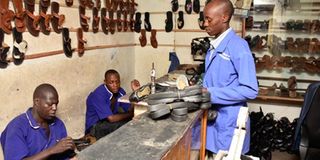Prime
From cobbler to shoe-maker

Above Naboth Dembe shows how he makes shoes with a machine, below he chats with other workers at his shop.Photo by Dominic Bukenya
What you need to know:
Carving my destiny. The shoe-maker’s journey started from vocational training. He would later have several work stints with a friend before he started his own business. Ronald D. Nasasira finds the details.
From a distance, Jeff Leather Products business centre in Kisugu, a Kampala suburb, on Muwayire Road seems like a mediocre shoe repair shop. On getting closer, you discover that a lot more goes on inside the average-sized room that is a workstation for three people.
Two gentlemen are seated on the same side. As one carves shoes around a wooden shoe-shaped block, his colleague is attaching the top part of the shoe to the shoe sole. On the right hand side is Naboth Dembe making a phone call. Listening in, and from the kind of conversation he’s having with the person on the other end of the line, he is summarising a shoe deal.
After he completed O-Level education in 1998, Naboth Dembe, the brains behind Jeff Leather Products, recalls that, instead of pursuing A-Level education, he decided to go to Uganda Technical College in Bushenyi District to acquire vocational skills and completed in 2001.
From there, he went to Kyambogo University and studied a course in technical education. “After completing my course,I had a friend who owned a shoe-making workshop where I worked for five years,” Dembe recalls.
While working at the workshop, a group of Australians discovered that Dembe and his friend were making good shoes.
“We were given an opportunity to teach shoe-making skills to children at the Training and Common Facility Centre (Crane Shoes),” Dembe says.
After the teaching programme ended, Dembe returned to Kyambogo to pursue a diploma in technical teacher education. Since he wanted to have hands-on job, it compelled him to retreat to his friend’s workshop.
“When I went back, the people I left at the workshop began mistreating me because I was educated. I couldn’t withstand it and sought to earn a living elsewhere,” Dembe narrates.
He later got a job at Crane Shoes as a trainer and production manager in 2008 until late 2011. “In 2012, I developed an idea of starting up my own business. I had saved Shs1m while working at Crane Shoes and with this money, I rented a small room in Kisugu and got material like African crafts and school shoes. At the same time, I was also a cobbler,” Dembe narrates.
Six months later, he got a helper because work kept piling as client’s numbers increased. “As I fixed people’s shoes and sold African crafts, I was also growing beans and bananas in the village. After the harvesting seasons, I got some money obtained from my produce and topped it up with what I was making from repairing shoes and sales and bought a scouring machine at Shs2m,” Dembe says.
With every step he took, clients kept flocking for his services. When Multiple Industries, manufacturers of plastic pipes placed an order of 100 pairs of safety shoes worth Shs7m, and Child Development Centre asked them to make 500 pairs of children’s shoes worth Shs17m, it was an eye opener for Dembe to expand his business.
In the first room he rented, which is now his store, he could easily stand in the middle and stretch his arms and touch the four walls. “These big orders inspired me to work harder. I got a second helper and asked my landlord if he could expand the size of the room where I was operating, and he accepted because he realised I was progressing,” he says while pointing at the current room where he operates.
Dembe still receives orders from different clients such as Momo Investments and a few orders to make children’s shoes. “I also get daily clients who come with photo images, sizes and specifications of shoes they want and I make them,” he notes.
Although he buys materials such as third and fourth class rubber from importers who get it from Kenya and Ethiopia, Dembe says he feels the pinch of incurring high costs from friends to be able to acquire the rubber material for shoe soles and leather.
From the materials, Dembe makes closed and open, men’s and women’s African crafts in brown and black colours, belts, school children’s shoes, gent’s shoes and safety and security shoes.
Challenges
Although he has been able to acquire shoes designing skills and managing the business from which he makes profits to look after his family, Dembe doesn’t operate without any challenges. “I mainly use the sewing and skiving machines that are run manually and this delays finishing client’s big orders,” he points out, adding that most of his clients who don’t attach value to his products offer to buy his shoes cheaply and that he doesn’t get a chance to get the best quality of materials to make long-lasting shoes.
Future plans
Through saving and reinvesting in his business, Dembe hopes to expand into a much bigger room to be able to do wide scale production, training and sales than he currently does. “I used to take on trainees from Kyambogo University and other institutions but I was limited by space. When I expand later this year, I will devise means of training students from different institutions to learn how to make shoes so that they can make a living out of it,” he concludes.




